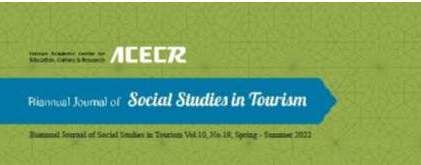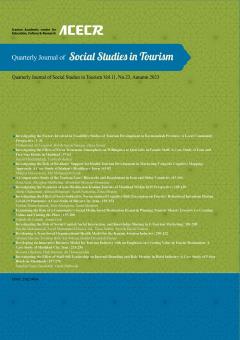Investigating the Factors Involved in Feasibility Studies of Tourism Development in Kermanshah Province: A Local Community Perspective
Subject Areas :Mohammad Ali Feizpour 1 , Habib Ansari samani 2 , zahra naseri 3 *
1 - Faculty of Economics, Management and Accounting,Yazd University, Yazd, Iran
2 - Faculty of Economics, Management and Accounting, Yazd University, Yazd,Iran
3 - Faculty of Economics, Management and Accounting, Yazd University, Yazd,Iran
Keywords: Feasibility Studies, Investment Assessment, Sustainable Tourism, Financial Assessment, Economic Assessment,
Abstract :
Considering the dependence of tourism on its host community and thus the interdependence of tourists and local residents, it could be argued that the culture and viewpoints of the local people may influence tourism activities. Therefore, the local community must be actively involved in the development process to ensure the success of feasibility studies, proper assessment of investments made in tourism, and the extension of tourism projects’ lifespan. In this regard, this study sought to perform a feasibility analysis of tourism activities, focusing on running a coffee shop in a representative tourist destination in Kermanshah Province, Iran. To this end, the tourism development project during the years 2019-2023 was examined in terms of financial and economic assessments, and the evaluation of its effects from the viewpoint of the local community. The financial and economic data were collected from the Statistical Center of Iran, and the data concerning the evaluation of the project’s effects from the local community’s perspective were gathered through a questionnaire. The results of the financial and economic feasibility study indicated that setting up the coffee shop was financially and economically viable and justified. On the other hand, the evaluation of the local residents’ viewpoint in this regard revealed that tourism could contribute to economic prosperity, the introduction of the region to others, feeling the sense of pride by the local people, and the restoration and reconstruction of historical buildings. This study attempted to identify the factors involved in the feasibility study of tourism and assess the local community's viewpoint regarding the effects of tourism. The findings of the study suggested that financial and economic feasibility studies along with an evaluation of the effects of tourism could contribute to the success of investment projects.
اسکونژاد، محمدمهدی. (1389). ارزیابی اقتصادی پروژههای صنعتی. چاپ چهارم. تهران: دانشگاه صنعتی امیرکبیر.
ایمانی جاجرمی، حسین؛ محمدی، انور و صالحی، سعدیه. (1398). «ارزیابی تأثیرات اجتماعی، اقتصادی و زیستمحیطی طرح اعتبارات بهسازی و نوسازی مساکن روستایی (روستای دهستان دولت آباد، شهرستان روانسر)». برنامهریزی توسعه کالبدی، 1(4). 55-39.
باباخانزاده، ادریس. (1392). «بررسي اثرات اقتصادي، اجتماعي- فرهنگي و زيست محيطي توسعه گردشگري بر منطقه اورامانات». برنامهریزی فضایی، 3(3)، 164-145.
دل افروز، نرگس و سلیمینیا، احسان. (1396). «ارزیابی عوامل موثر بر نگرش جامعه میزبان به گردشگری و حمایت از توسعه آن». مطالعات جغرافیا، عمران و مدیریت شهری، 2(3)، 255-248.
سامیان، مسعود و بلالی، حمید. (1392). «بررسی اثرات اقتصادی _ اجتماعی گردشگری روستایی با استفاده از رویکرد سیستمی (مطالعه موردی: در روستای فرجین در همدان)». مجله برنامهریزی و توسعه گردشگری، 2(4)، 180-159.
سیدمطهری، مهدی. (1386). ارزیابی طرحهای تولیدی، سرمایهگذاری و تأمین مالی پروژهها. چاپ پنجم. تهران: چاپ و نشر بازرگانی.
عنابستانی، علیاکبر؛ زیاری، یوسفعلی و عنابستانی، زهرا. (1392). «بررسی آثار شرکت گردشگری پدیده بر توسعه شهرری در شاندیز». مجله برنامهریزی و توسعه گردشگری، 2(5)، 182-158.
فرجی، امین؛ نعمتپور، محمد و عشریه، امید. (1396). «تحلیل سیستمی اثرات مثبت و منفی توسعه گردشگری ایران با رویکرد آینده پژوهی». نشریه مطالعات اجتماعی گردشگری، 9(5)، 189-151.
کروبی، مهدی؛ احمدی، ساسان و رسولی، محمد. (1395). «ارزیابی اثرات اجتماعی- فرهنگی گردشگری بر جامعه میزبان (مطالعه موردی: شهر بانه)». دو فصلنامه مطالعات اجتماعی گردشگری، 8(4)، 21-1
مجیدیان، داوود. (1382) .ارزیابی طرحهای صنعتی. چاپ هشتم. تهران: سازمان مدیریت صنعتی.
مطیعی لنگرودی, سیدحسن و رضائیه آزادی، مریم. (1392). «ارزیابی اثرات اقتصاد گردشگری از دیدگاه جامعه میزبان در تفرجگاه بند ارومیه». فصلنامه اقتصاد فضا و توسعه روستایی، 2(4)، 91-75.
مطیعی لنگرودی، سید حسن و حیدری، زهرا. (1391). «متنوعسازی اقتصاد روستاهای ساحلی با تأکید بر گردشگری صیادی (مورد: روستاهای ساحلی شهرستان تنکابن)». فصلنامه اقتصاد فضا و توسعه روستاییT 1(1)، 38-19.
مطیعی لنگرودی، سیدحسن و کاتب ازگمی، زهرا. (1396). «پیامدهای اقتصادی توسعه فعالیت¬های گردشگری روستایی در شهرستان بندر انزلی (مورد: دهستان لیچارکی حسنرود)». فصلنامه اقتصاد فضا و توسعه روستایی، 6(21)، 16-1.
ناصری، زهرا و فیضپور، محمدعلی. (1400). «ارائه رویکرد یکپارچه امکان¬سنجی در گردشگری». چهارمین کنفرانس بینالمللی سالانه تحولات نوین در مدیریت، اقتصاد و حسابداری، تهران، انجمن تعالی کسب¬وکار ایران.
Abou-Zeid, A., Bushraa, A., & Ezzat, M. (2007). Overview of feasibility study procedures for public construction projects in Arab countries. Engineering Sciences, 18(1), 19-34.
Ahmed, M. N., Mohammed, H. A., Aswed, G. K., & Alyhya, W. S. (2019). Investigating factors affecting feasibility study of construction projects in Iraq. Periodicals of Engineering and Natural Sciences (PEN), 7(3), 1209-1217.
Aziri, B., & Nedelea, A. (2013). Business strategies in tourism. Ecoforum Journal, 2(1), 1-7.
Becker, H. A. (2001). Social impact assessment. European Journal of Operational Research, 128(2), 311-321.
Blake, A., Arbache, J. S., Sinclair, M. T., & Teles, V. (2008). Tourism and poverty relief. Annals of Tourism Research, 35(1), 107-126.
Bramwell, B., & Lane, B. (2000). Tourism collaboration and partnerships: Politics, practice and sustainability. Bristol: Channel View Publications.
Brinckmann, J., Grichnik, D., & Kapsa, D. (2010). Should entrepreneurs plan or just storm the castle? A meta-analysis on contextual factors impacting the business planning–performance relationship in small firms. Journal of Business Venturing, 25(1), 24-40.
Castrogiovanni, G. J. (1996). Pre-startup planning and the survival of new small businesses: Theoretical linkages. Journal of Management, 22(6), 801-822.
Clarke, S., & Roome, N. (1999). Sustainable business: learning–action networks as organizational assets. Business Strategy and the environment, 8(5), 296-310.
Cohen, E. (1987). Alternative tourism—A critique. Tourism Recreation Research, 12(2), 13-18.
Costa, C. (2001). An emerging tourism planning paradigm? A comparative analysis between town and tourism planning. International Journal of Tourism Research, 3(6), 425-441.
Cui, C., Liu, Y., Hope, A., & Wang, J. (2018). Review of studies on the public–private partnerships (PPP) for infrastructure projects. International Journal of Project Management, 36(5), 773-794.
Durbarry, R. (2004). Tourism and economic growth: the case of Mauritius. Tourism Economics, 10(4), 389-401.
Dwyer, L., Forsyth, P., Madden, J., & Spurr, R. (2000). Economic impacts of inbound tourism under different assumptions regarding the macroeconomy. Current Issues in Tourism, 3(4), 325-363.
Gailly, B. (2011). Developing innovative organizations: a roadmap to boost your innovation potential. London: Palgrave Macmillan.
Goel, A., Ganesh, L. S., & Kaur, A. (2020).Social sustainability considerations in construction project feasibility study: a stakeholder salience perspective. Engineering, Construction and Architectural Management, 27(7), 1429–1459
Hall, C. M. (1999). Rethinking collaboration and partnership: A public policy perspective. Journal of sustainable tourism, 7(3-4), 274-289.
Hardy, A. L., & Beeton, R. J. (2001). Sustainable tourism or maintainable tourism: Managing resources for more than average outcomes. Journal of Sustainable Tourism, 9(3), 168-192.
Heralova, R. S. (2017). Life cycle costing as an important contribution to feasibility studies in construction projects. Procedia Engineering, 196, 565-570.
Jain, P. K. (1999). Theory and problems in financial management. New York City: McGraw-Hill Education.
Juma, L. O., & Khademi-Vidra, A. (2019). Community-based tourism and sustainable development of rural regions in Kenya; Perceptions of the citizenry. Sustainability, 11(17), 4733.
Khalil, S., Kakar, M. K., & Malik, A. (2007). Role of tourism in economic growth: Empirical evidence from Pakistan economy. The Pakistan Development Review, 46(4), 985-995.
Lak, A., Gheitasi, M., & Timothy, D. J. (2020). Urban regeneration through heritage tourism: cultural policies and strategic management. Journal of Tourism and Cultural Change, 18(4), 386-403.
Lama, R. (2014). Community-based tourism development (a case study of Sikkim) (Doctoral dissertation, Kurukshetra University).
Law, C. M. (1985). Urban tourism: selected British case studies. Urban tourism project working paper 1. united kingdom: Department of Geography, University of Salford.
LeBrasseur, R., Zanibbi, L., & Zinger, T. J. (2003). Growth momentum in the early stages of small business start-ups. International Small Business Journal, 21(3), 315-330.
Liu, A., & Wall, G. (2006). Planning tourism employment: a developing country perspective. Tourism Management, 27(1), 159-170.
Mukherjee, M., & Roy, S. (2017). Feasibility studies and important aspects of project management. International Journal of Advanced Engineering and Management, 2(4), 98-100.
Murphy, K. E., & Simon, S. J. (2002). Intangible benefits valuation in ERP projects. Information Systems Journal, 12(4), 301-320.
Murphy, P. E., & Murphy, A. E. (2004). Strategic management for tourism communities. Bristol: Channel View Publications.
Nunkoo, R., Seetanah, B., & Agrawal, S. (2019). Innovations in sustainable tourism research. Tourism Review, 74(2), 129-137.
Okon, E. E., & Morgan, M. O. (2018). The potency of feasibility analysis on business survival in Cross River State Southern Senatorial District, Nigeria. Global Journal of Social Sciences, 17, 69-76.
Pullteap, S., & Kheovichai, K. (2019). Feasibility Analysis of Investment Cost for Medical Equipment Business via E-commerce System. 7th International Electrical Engineering Congress.
Salazar, N. B. (2012). Community-based cultural tourism: issues, threats, and opportunities. Journal of Sustainable Tourism, 20(1), 9-22.
Satria, A. D., & Soegoto, H. H. (2018). Feasibility Study of PT Fixall. Proceedings of the International Conference on Business, Economic, Social Science, and Humanities (ICOBEST 2018).
Scarborough, N. M., & Zimmerer, T. W. (2012). Effective small business management: An entrepreneurial approach, 10th ed. New Jersey: Prentice Hall.
Shane, S., & Delmar, F. (2004). Planning for the market: business planning before marketing and the continuation of organizing efforts. Journal of Business Venturing, 19(6), 767-785.
Shen, L. Y., Tam, V. W., Tam, L., & Ji, Y. B. (2010). Project feasibility study: the key to successful implementation of sustainable and socially responsible construction management practice. Journal of cleaner production, 18(3), 254-259.
Slee, B., Farr, H., & Snowdon, P. (1997). The economic impact of alternative types of rural tourism. Journal of agricultural economics, 48(1‐3), 179-192.
Smith, G. F. (2002). Getting Started in a Recreation or Tourism Business. United States: University of Tennessee, Institute of Agriculture.
Sofiah, E., & Septiana, Y. (2017). Sistem Pendukung Keputusan Feasibility Study untuk Menilai Kelayakan Sebuah Bisnis. Jurnal wawasan ilmiah, 8(1), 1-7.
Stabler, M. J., Papatheodorou, A., & Sinclair, M. T. (2010). The social context of tourism decision-making. The Economics of Tourism (2nd ed.). Abingdon: Routledge.
Suryadimal. Ganefri. Ambiyar. Jalinus, N., Rizal, F., & Darmayanti, Y. (2020). Identification of development of feasibility assessment for community-based water power plant. Journal of Physics: Conference Series. Canada.
Syed Alwee, S. N. A., Salahuddin, N., Mohamed Sabli, N. A., Isnaini Janipha, N. A., & Maisham, M. (2019). The importance of information in the preparation of feasibility study for construction development. Voice of Academia (VOA), 14(1), 64-73.
Tosun, C. (2000). Limits to community participation in the tourism development process in developing countries. Tourism Management, 21(6), 613-633.
Tsimplokoukou, K., Sfakianaki, E., & Metaxas, G. (2012). A feasibility study approach for underground railways-a case study: line 4 of Athens metro. Global Journal of Engineering Education, 14(1), 91-98.
UNEP and UNWTO. (2005). Making Tourism More Sustainable- A Guide for Policy Makers. 11-12.
Yuksel, F., Bramwell, B., & Yuksel, A. (1999). Stakeholder interviews and tourism planning at Pamukkale, Turkey. Tourism Management, 20(3), 351-360.
Yun, S., & Caldas, C. H. (2009). Analyzing decision variables that influence preliminary feasibility studies using data mining techniques. Construction Management and Economics, 27(1), 73-87.

